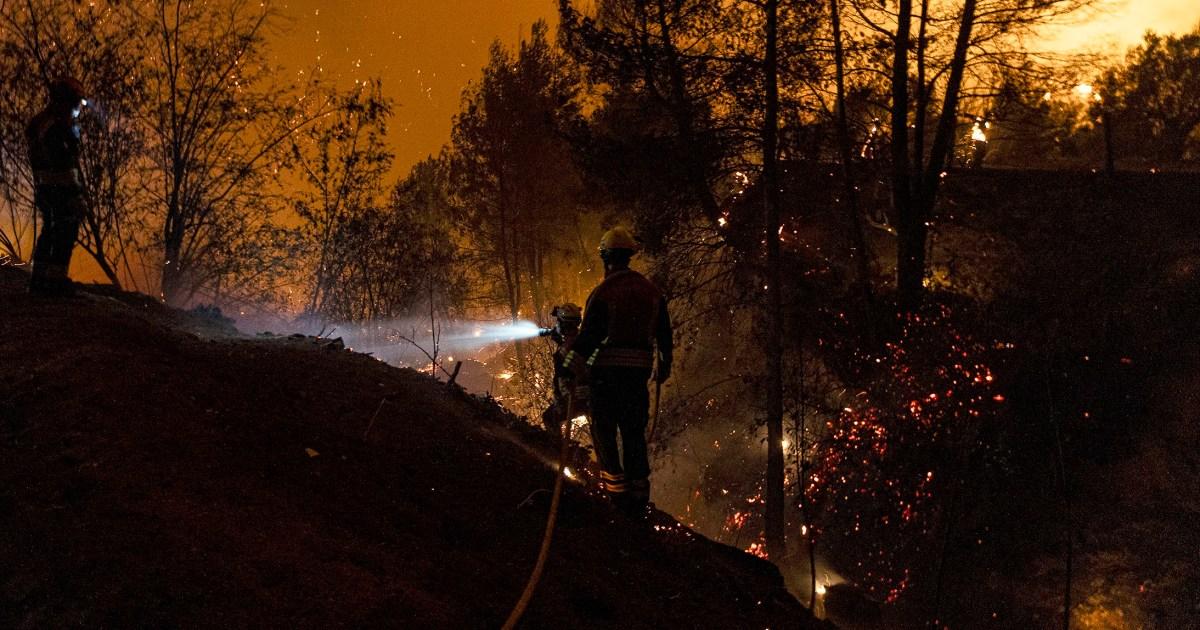Wildfires are sweeping across Europe at an alarming rate, burning through thousands and thousands of acres.
Extreme heat has hit parts of the Mediterranean and Balkans, with temperatures being forecast to go over the 40°C mark.
Hot air from Africa plus a high pressure system is behind this ‘historic’ heatwave.
Families heading to Spain have been told to brace themselves for the weather.
Swathes of southern Europe are also at ‘extreme’ risk of wildfires, with a number of Balkan nations already battling flames stoked by high temperatures, winds and a weekslong drought.
This is everything you need to know about how it is affecting the weather across Europe.
Spain
More than 150 people have been evacuated from the coastal province of Alicante amid a ‘severe’ wildfire.
Flames have been burning through dry vegetation for more than 24 hours in the Benasau municipality.
The fire broke out on Tuesday afternoon near a water treatment plant, and sparks from a radial saw were being considered as a potential cause, according to the Alicante Provincial Firefighters Consortium.
Another one, in the province of Cuenca, has destroyed more than 1,500 hectares of vegetation since Tuesday.
Spain has already been experiencing extreme temperatures since the beginning of the summer, which is fuelling the wildfires.
This is the country’s third heatwave over the last two weeks.
Authorities have been issuing health alerts, adding that the heat poses a particular danger to tourists who are not used to them.
The Balearic Ministry of Health urged people to ‘take extreme precautions’ ahead of what will be a second heatwave in the area this month.
Mallorca – a major tourist destination for Brits – is among the islands that will be hit.
Temperatures in the region has already surpassed 40°C, with the same forecast for Wednesday.
‘We still have a very difficult month, August, ahead of us and obviously we all need to be on high alert,’ he told ministers during a cabinet meeting.
Because of the high temperatures, multiple tourist attractions like the Acropolis in Athens have been closed for periods of time.
Italy
Italy’s health ministry has issued a ‘red alert’ in 13 cities due to expected extreme heat in the coming days.
This includes Rome, Bologna, Bolzano, Brescia, Florence, Frosinone, Latina, Milan, Palermo, Perugia, Rieti, Torino and Naples.
People – particularly the elderly, children, pregnant women – have been urged to exercise caution because the weather conditions could endanger their health.
Greece
More than 200 firefighters backed up by helicopters and water-carrying jets are battling a wildfire on Greece’s second-biggest island of Evia for a second day on Tuesday.
Authorities have ordered the evacuation of two villages, forcing dozens of people to abandon their homes.
Flames broke out near the village of Petries in the centre of Evia at about 3pm onMonday and strong winds fuelled its spread.
While the situation had slightly improved on Tuesday, flare ups remain a risk due to the windy conditions, a fire service spokesperson said.
13 aircraft and six helicopters were at the scene on Tuesday about 37 miles of the capital, Athens.
A coastguard vessel was on standby overnight for possible evacuations by sea.
‘It was – and is – a difficult fire as it started in a difficult spot,’ climate crisis and civil protection Minister Vassilis Kikilias, who travelled to Evia late on Monday, was quoted as saying by state broadcaster ERT.
Greece has been experiencing its most severe wildfire risk in two decades, with some reservoirs hitting their lowest levels in 10 years.
All fire services are currently on high alert due to multiple nationwide incidents and prevailing weather conditions.
Flames across Greece have been spreading, despite the extensive efforts of both firefighters and volunteers.
Prime minister Kyriakos Mitsotakis said Greece had been dealing with ‘a very difficult summer’ in terms of climate conditions.
Croatia
Firefighters in Croatia described the past 24 hours as the most demanding they have faced this summer.
More than 100 incidents have been recorded that involved over 1,000 firefighters and 20 firefighting planes.
The most serious incident in Croatia overnight was near the small town of Tucepi, along the country’s southern coast, where one firefighter was injured.
A strong wind that blew throughout the night made it much harder to combat the raging flames stretching for at least a mile.
Croatian state broadcaster HRT said residents in the area went through a sleepless night.
Some had to evacuate their homes while power supplies were cut and several explosions could be heard, apparently from gas canisters.
Local official Ante Cobanic said he tried to help extinguish a small fire before it suddenly spread in the space of five minutes. ‘The speed was incredible,’ he said.
The fire was under control by mid-morning Wednesday with all emergency forces still on alert.
North Macedonia, Bulgaria and Albania
All three nations have sough help from abroad to battle the fires triggered by prolonged heatwaves.
North Macedonia’s emergency center chief Stojanche Angelov said that if the situation worsens further the government should ask Nato to help after it sought European Union assistance on Tuesday.
‘At this moment there is no need, but the assistance might be needed later today,’ Angelov said.
Large wildfires in parts of North Macedonia this week destroyed and damaged homes and forced evacuations.
An elderly resident in a village some 37 miles east of the capital Skopje.
Neighboring Bulgaria’s border with Greece was also affected, with one of the two biggest fires active there.
The other blaze was raging Wednesday in the Maleshevska Mountain on the border with North Macedonia.
Tens of thousands of acres of forests, as well as of agricultural land were affected, the fire service said.
Hundreds of Albanian firefighters, military personnel and volunteers managed to get under control a major fire in the coastal town of Shengjin after it burned a house roof and two beach bars, sending visitors fleeing in panic.
Planes provided by the EU Civil Protection Mechanism have joined firefighting efforts in both Bulgaria and Albania.
What should you drink in a heatwave?
It’s well worn advice to drink plenty of fluids in order to avoid dehydration.
Before you reach for your water bottle, though, a doctor has claimed there’s a better option when managing a heatwave: milk.
It’s not the usual go-to come summer; we all remember Anchorman’s Ron Burgundy proclaiming ‘milk was a bad choice’ in the sweltering sunshine, right?.
However, Dr Natasha Fernando, medical director at Medichecks, says it ‘may be more hydrating than water’. Read why that’s the case here.
Get in touch with our news team by emailing us at webnews@metro.co.uk.
For more stories like this, check our news page.
MORE : All the times wild weather almost ruined the Olympics
MORE : Map shows where flood alerts are in place ahead of thunderstorms
MORE : Just Stop Oil protesters arrested at Heathrow as flights cancelled at airports
Get your need-to-know
latest news, feel-good stories, analysis and more
This site is protected by reCAPTCHA and the Google Privacy Policy and Terms of Service apply.



















